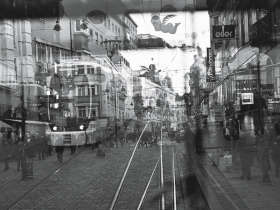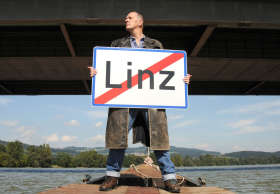Hörstadt / Acoustic City

Copyright: Pondell
Our acoustic environment is a concrete manifestation of our living conditions. Sound affects us directly and unavoidably—after all, we can’t turn off our hearing. Nevertheless, society’s acoustic awareness is severely underdeveloped. And architects and traffic & urban planners have turned a deaf ear to people’s concerns. Technical revolutions have brought forth all-encompassing noise pollution and brought about the commercialization of hearing. Products ranging from cars to cookies are acoustically designed to accentuate their quality. Advertising counters visual stimulus overload by raining down audible messages on consumers. Stores, shopping malls, restaurants, waiting rooms, telephone on-hold loops and even public toilets are the scenes of the inescapable musical bombardment of millions of people. All this happens in a legal vacuum beyond the fringe of noise abatement legislation highly limited in its purview. We live in the Wild West of hearing, a lawless land where there is practically no binding regulation of our acoustic coexistence in a democratic society. ACOUSTIC CITY took the concept of Linz’s legendary Klangwolke (Cloud of Sound) to the next level, and developed unprecedented ways for the city to unfold its extraordinary potential in this area. Politics, business, culture, art, education and tourism must declare the human being to be a holistic entity, an acoustic being, the center of considerations, the measure of all things. We must listen to what’s beyond fashion and transient technologies.
ACOUSTIC CITY is an initiative seeking to achieve an audible environment intentionally designed to be fit for human beings. It consists of a campaign to STAMP OUT ACOUSTIC POLLUTION, the Linzer Charta that established guidelines for urban acoustic planning, and the Akustikon, a space in downtown Linz dedicated to hearing-related phenomena. The ACOUSTIC CITY agenda has the support of numerous individuals and institutions active in social and cultural life.
WAS // Conscious hearing
WHEN // Since 2007
WHERE // In Linz and various partner cities
www.hoerstadt.at
PARTICIPIANTS //

No Music Day

Bill Drummond
Copyright: Tracey Moberly
The Scottish artist, pop musician (The KLF) and publicist Bill Drummond proclaimed No Music Day in 2006, a day on which everyone should get away from the constant stream of music to become aware again of the real significance of songs and music. The date chosen was 21 November, the eve of the namesday of St Cecilia, who is considered the patron saint of music. In 2007 Drummond succeeded in winning over BBC Scotland to dispense entirely with music, including jingles, on NO MUSIC DAY. The aim to get the iTunes store to go offline on 21 November has not yet been achieved but it has not been abandoned either. In 2008 Brazil is the international epicentre of NMD, in 2009 Linz will quietly step into those shoes.
Programme 20 November
20 November 20:00, Live DJ-Set, OK-Offenes Kulturhaus
This live DJ-Set with DJ DSL (Hamburg/Vienna) at Solaris Bar, starts at 8 p.m. sharp and ends at 12 p.m. sharp. Admission free.
20 November 0.00, Welcoming, OK-Offenes Kulturhaus.
At the stroke of Midnight as DSL's set ends, Bill Drummond will welcome in No Music Day 2009.
Programme 21 November
6pm, Soup Making, Outside OK–Offenes Kulturhaus, Linz
At 6pm Bill Drummond will start to make soup in the public space outside OK - Offenes Kultuhaus. The soup will be ready by 8pm. As long as supplies last, it will be free to all those that turn up and answer one of his questions. This is part of his Soup Lines International project.
6pm, Moviemento Cinema, Linz
At 6pm Moviemento Cinema will screen the first of the evenings two films without music.
6pm, the first film is "Ten Skies" (James Benning / USA / 2004)
8pm, the second film is "13 Lakes" (James Benning / USA / 2004)
10.30pm, Performance/Lecture, Solaris Bar, OK-Offenes Kulturhaus, Linz
At 10.30pm, Bill Drummond will give a talk about the hows & whys he imagined No Music Day in the first place; the successes and failures of the No Music Day between 2005 and 2009; and what could become of No Music Day in the future. Admission free.
The following are a cross section of the institutions and business' in Linz and Upper Austria that, in their various ways, will be observing No Music Day 2009:
Church: The Jesuit parrish of the Old Cathedral Saint Ignatius will celebrate all masses on No Music Day without organ, choir or any congregational singing whatsoever;
Radio: Upper Austria's Radio FRO will resist from playing any music for the 24 hours.
Supermarkets: Throughout Upper Austria the 122 branches of the SPAR and 140 branches of the Maximarkt will not be playing piped music.
Schools: The Upper Austrian Music School will be closed. The students will spend the day discussing the future of music.
Shops: The majority of shops along Linz' central shopping mile Landstrasse will not run their instore radio stations or soundsystems, including for example the Diesel flagship store.
Shops: The majority of shops along Linz' central shopping mile Landstrasse will not run their instore radio stations or soundsystems, including for example the Diesel flagship store.
Cinema: Moviemento Cinema will be screening films that use no musical soundtrack - further details below.
Venues: The cities culture institutions, concert halls and music spots will hosts no concerts, gigs or DJs. These venues include the Brucknerhaus, Posthof, Ars Electronica Center (featuring No Music Day on its huge glass front to the city and the Danube), Café Strom, Grand Hotel Café Zum Rothen Krebsen, the OK - Offenes Kulturhaus and the Solaris Bar (playing a central role on No Music Day 2009).
Category: Acoustic City, Music, Lectures
to the project page
back





